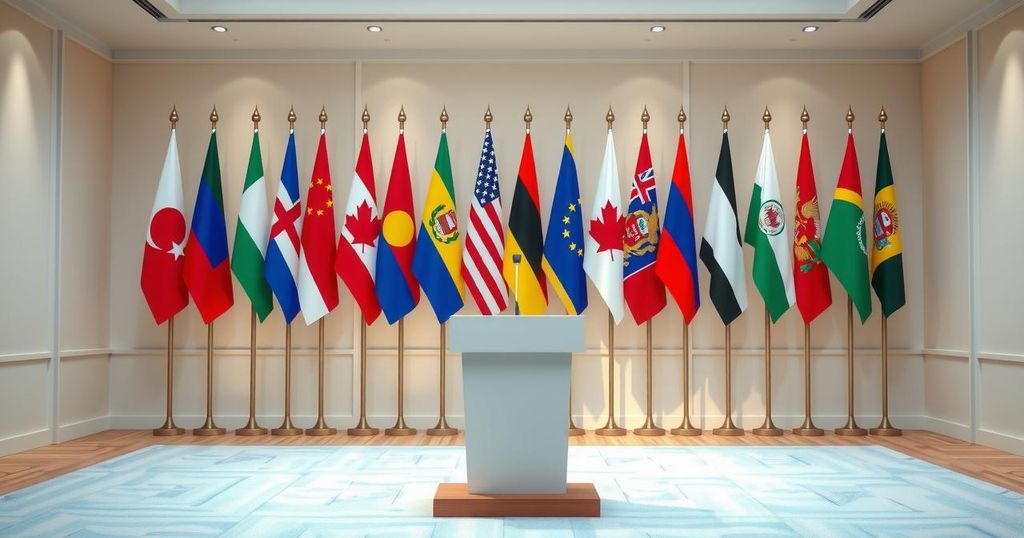Syria’s caretaker Foreign Minister, Mr. Asaad al-Shaibani, addressed the OPCW’s Executive Council, emphasizing the new government’s commitment to transparency and justice. He pledged to eliminate remnants of the former chemical weapons program and sought international support. This address follows a visit by OPCW Director-General Fernando Arias, who affirmed the prospective cooperation between Syria and the OPCW. The Director-General’s outlined 9-point Action Plan focuses on ensuring compliance with the Chemical Weapons Convention.
In an important development, Syria’s caretaker Foreign Minister, Mr. Asaad Hassan al-Shaibani, addressed the 108th session of the Executive Council at the Organisation for the Prohibition of Chemical Weapons (OPCW) on March 5, 2025, in The Hague. He affirmed Syria’s determination to undertake the reconstruction of the country through transparency and cooperation with the international community.
Minister al-Shaibani reaffirmed, “[…] the new Syrian Government is present here, today, and it is determined to reconstruct the future of the new Syria based on transparency, justice, and cooperation with the international community.” He emphasized the commitment to eliminate any remnants of the chemical weapons program developed under the previous regime, aiming to provide justice for victims while ensuring compliance with international law.
The Minister’s participation followed a visit by OPCW Director-General, Ambassador Fernando Arias, to Damascus on February 8, 2025, where he met with interim President Ahmed al-Sharaa and Minister al-Shaibani. This meeting set the foundation for enhanced collaboration between Syria and the OPCW.
Director-General Arias noted, “The OPCW welcomes the visit of the Syrian caretaker Foreign Minister and his participation in the Executive Council. This demonstrates the strong commitment of the new Syrian authorities to cooperate with the OPCW to eradicate all chemical weapons in Syria.” He highlighted the opportunity presented by the changing political landscape in Syria to complete the elimination of its chemical weapons program.
Following the Executive Council session, Director-General Arias outlined the OPCW’s readiness to assist the new Syrian authorities in fulfilling obligations under the Chemical Weapons Convention (CWC), emphasizing the deployment of technical experts to Damascus shortly.
Despite Syria’s accession to the CWC in October 2013, concerns over the accuracy of the previous declaration have persisted. Various OPCW teams, including the Declaration Assessment Team (DAT), have reported challenges in confirming the completeness of Syria’s declaration. Furthermore, instances of chemical weapons use have been documented, leading to suspended rights for Syria within OPCW organs.
During the meeting in Damascus, the Director-General introduced a 9-point Action Plan outlining the steps to ensure compliance with the CWC, which includes compiling an inventory, declaring all elements of the chemical weapons program, and ensuring long-term adherence.
The Executive Council is tasked with supervising the Technical Secretariat’s activities, and the OPCW, comprising 193 Member States, is endorsed as the principal body overseeing global chemical weapons disarmament, having received the 2013 Nobel Peace Prize for its efforts.
The recent engagement of Syria’s caretaker Foreign Minister at the OPCW underscores a pivotal effort to address the legacy of chemical weapons in the country. The commitment to transparency and cooperation marks a significant step towards reconciliation and compliance with international norms, supported by the OPCW’s readiness to assist. The 9-point Action Plan aims to ensure that Syria adheres fully to its obligations under the Chemical Weapons Convention, fostering a path towards peace and justice.
Original Source: www.opcw.org






